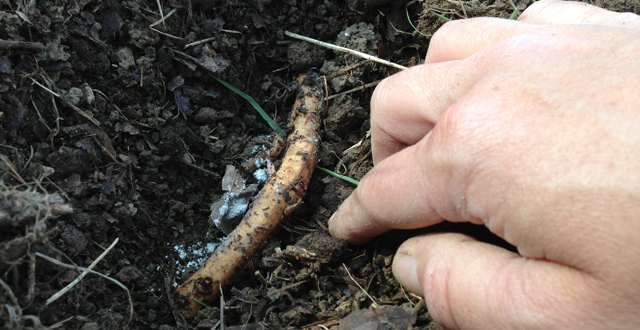
One of the most important organic cultural practices I use on the farm is inoculating crops with mycorrhizal fungi. The photo above shows an application on one of 100 organic hop rhizomes we just planted. The symbiotic relationship between this fungus and plant roots is essential for healthy soil and plants. It’s also the secret that all of the current world record pumpkin growers don’t want you to know.
There are a couple types of mycorrhizal fungi. Endomycorrhiza work with certain plants by attaching to the root intracellularly while ectomycorrhiza work extracelluarly. Here is a good resource to find out which mycorrhiza you need for various plants and trees.
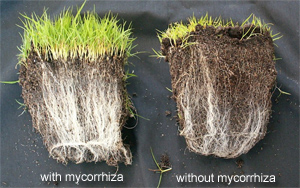 How it works: The fungi is naturally occurring in healthy soil all over the world. The largest living organism on the planet is a 2,400 year old 2,200 acre mycelial mat discovered in August 2000 in Oregon’s Malheur National Forest. Mycorrhizae are the very life of our planet’s soil creating a network of microbial life that naturally mitigates disease, nutrition and water concerns in the cultivation of crops. Mycorrhizae reduce the use of tilling, irrigation and chemical inputs in aggriculture. It also helps sequester carbon and is a key environmental relationship in our survival on the planet. Many organic farmers who use mycorrhizal fungi never have to water their crops even during drought. You can see several of these side-by-side comparisons pictured here online that illustrate exactly why.
How it works: The fungi is naturally occurring in healthy soil all over the world. The largest living organism on the planet is a 2,400 year old 2,200 acre mycelial mat discovered in August 2000 in Oregon’s Malheur National Forest. Mycorrhizae are the very life of our planet’s soil creating a network of microbial life that naturally mitigates disease, nutrition and water concerns in the cultivation of crops. Mycorrhizae reduce the use of tilling, irrigation and chemical inputs in aggriculture. It also helps sequester carbon and is a key environmental relationship in our survival on the planet. Many organic farmers who use mycorrhizal fungi never have to water their crops even during drought. You can see several of these side-by-side comparisons pictured here online that illustrate exactly why.
Conventional farming methods using chemical fertilizers, pesticides and tilling are slowly destroying this natural relationship in favor of predictable short-term outcomes from dependence on expensive inputs that often hide destructive and unsustainable results.
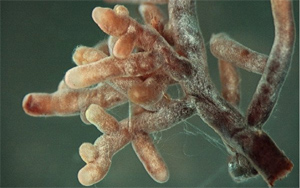 Perfect design: Mycorrhizae are basically a mushroom (mycelium) that feeds off the plant’s sugars through its root system. What the fungus does in return for plants is truely amazing: it takes nutrients and water from the soil and feeds the plant by becoming a huge network of extended roots. The fungi is also what breaks down rocks and minerals for plants. It also makes plants more drought resistant as their access to soil moisture is more than ten times that of non-inoculated plants. One application to roots during transplanting or seeding lasts the entire life of the plant, and the results are indisputable.
Perfect design: Mycorrhizae are basically a mushroom (mycelium) that feeds off the plant’s sugars through its root system. What the fungus does in return for plants is truely amazing: it takes nutrients and water from the soil and feeds the plant by becoming a huge network of extended roots. The fungi is also what breaks down rocks and minerals for plants. It also makes plants more drought resistant as their access to soil moisture is more than ten times that of non-inoculated plants. One application to roots during transplanting or seeding lasts the entire life of the plant, and the results are indisputable.
There is a lot of simple research showing plants do much better using mycorrhizae than using conventional fertilizers. Here is a 6th grader’s science fair project using Fungi Perfecti’s MycoGrow (what we use at Half hill Farm) to show you how simple this is to understand.
Products:
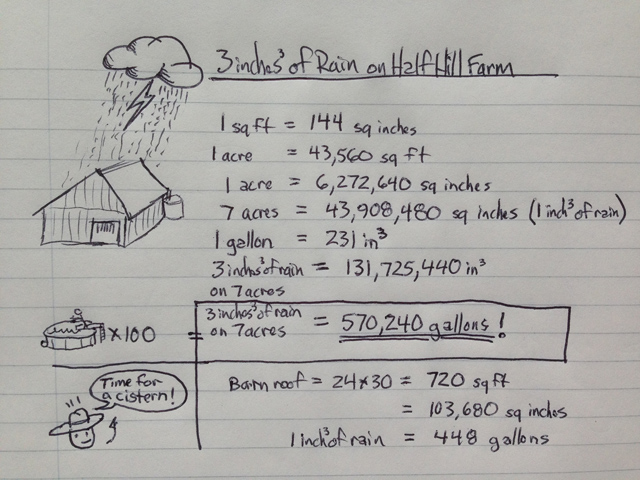


 How it works: The fungi is naturally occurring in healthy soil all over the world.
How it works: The fungi is naturally occurring in healthy soil all over the world.  Perfect design: Mycorrhizae are basically a mushroom (mycelium) that feeds off the plant’s sugars through its root system. What the fungus does in return for plants is truely amazing: it takes nutrients and water from the soil and feeds the plant by becoming a huge network of extended roots. The fungi is also what breaks down rocks and minerals for plants. It also makes plants more drought resistant as their access to soil moisture is more than ten times that of non-inoculated plants. One application to roots during transplanting or seeding lasts the entire life of the plant, and the results are indisputable.
Perfect design: Mycorrhizae are basically a mushroom (mycelium) that feeds off the plant’s sugars through its root system. What the fungus does in return for plants is truely amazing: it takes nutrients and water from the soil and feeds the plant by becoming a huge network of extended roots. The fungi is also what breaks down rocks and minerals for plants. It also makes plants more drought resistant as their access to soil moisture is more than ten times that of non-inoculated plants. One application to roots during transplanting or seeding lasts the entire life of the plant, and the results are indisputable.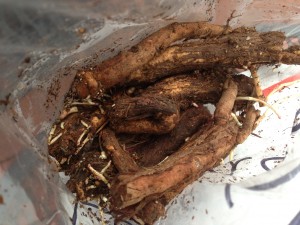 Two things I’m very excited about arrived at the farm this week. First is the
Two things I’m very excited about arrived at the farm this week. First is the